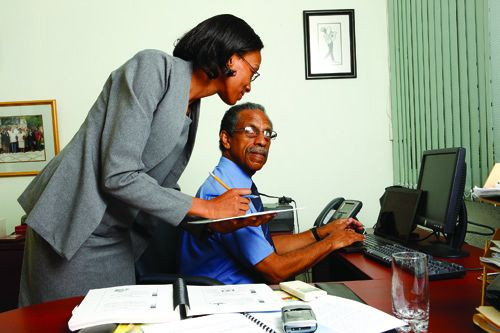AIDS Expert, Brendan Bain, Fired By University For Saying Homosexuality Is Threat To Public Health; Supporters Protest

Jamaica's largest university fired the head of an HIV/AIDS public health institute who testified in favor of laws banning homosexuality. The University of the West Indies said anti-sodomy laws violate human rights and discourage treatment. Now the retired professor, Brendan Bain, has become a flashpoint in the Caribbean over academic speech and the region's AIDS epidemic.
On Monday, religious groups, students and faculty protested at the university, the Associated Press reported. “This is a free speech issue, and it’s a truth issue,” said Dr. Doreen Brady-West, an oncology professor there. Others at the protest used words like "homo-fascists" and decried the mainstream acceptance of homosexuality.
Bain, who was not at the protests, was the chair of the university's public health department until he retired in 2013. In 2012, Bain gave expert testimony on behalf of religious groups in a Belize court case in which a gay man sought to challenge the country's ban on gay sex. In his statement, he wrote that private behavior can "turn out to have serious deleterious public consequences." He said the high rate of HIV/AIDS and other sexually transmitted diseases among gay men is an economic scourge, creating "significant and avoidable financial costs" to citizens and governments.
The court challenge sought to overturn a law created in 1861 that criminalizes gay sex. Its claimant, Caleb Orozco, says he is the only gay rights activist in Belize and has received death threats. The case is still pending in the Supreme Court.
On May 20, two years after giving testimony, the University of the West Indies ousted Bain from his job as head of the Caribbean HIV/AIDS Regional Training Centre, or CHART, which trains health professionals in HIV/AIDS treatment. "While the University recognises the right of Professor Bain to provide expert testimony in the manner he did," the university said in a statement, "it has become increasingly evident that Professor Bain has lost the confidence and support of a significant sector of the community which the CHART programme is expected to reach."
The Caribbean is second only to sub-Saharan Africa in HIV prevalence. In Jamaica, where one in three gay men has the virus, an anti-sodomy law, left over from colonial Britain (the UK has abolished its law), is still in effect. It is true, as Bain testified, that HIV/AIDS disproportionately affects gay men, including in the United States. Fifty-six percent of all HIV-positive people in the U.S. are gay and bisexual men.
Yet very few credible health experts believe laws against homosexuality will improve health outcomes. All of the major world health agencies, including the United Nations and the World Health Organization, oppose such laws. "The majority of HIV and public health experts believe that criminalising men having sex with men and discriminating against them violates their human rights, puts them at even higher risk, reduces their access to services, forces the HIV epidemic underground thereby increasing the HIV risk," the University of the West Indies said in its statement.



























